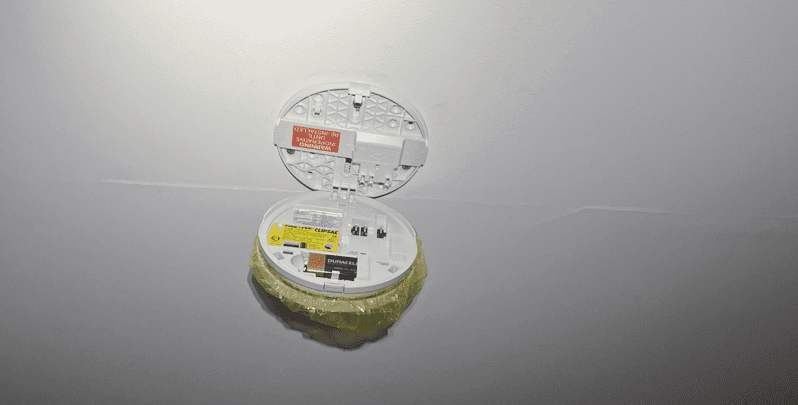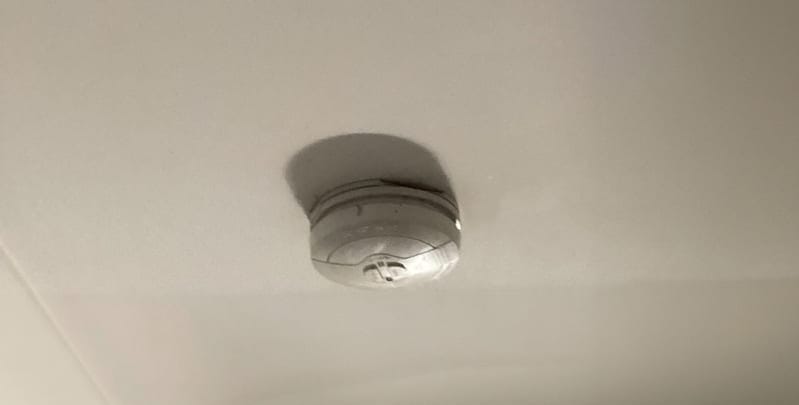
Is Your Smoke Alarm Always Chirping?
A beeping smoke detector can be both annoying and alarming, especially when it’s hard-wired into your home’s electrical system. Getting to the heart of the question “why is my hard-wired smoke detector beeping?” is crucial for maintaining safety and peace of mind. Whether it’s a low battery, a build-up of dust and debris, or an electrical issue, several factors could be at play.
Let’s explore the common reasons behind that persistent chirping noise and offer practical solutions to get your smoke alarm back in working order. We’ll also discuss the importance of using a licensed electrician for installation and repairs, ensuring your home remains safe from potential fire hazards.
Common Causes of Beeping in Hard-Wired Smoke Detectors
Several common causes can explain why your hard-wired smoke detector is beeping:
- Low battery: Even hard-wired smoke alarms have backup batteries that need replacing periodically. A low battery can cause that annoying beeping sound.
- Dust buildup: Dust and debris inside the smoke detector can trigger false alarms. Regular cleaning can prevent this issue.
- Electrical issues: Problems with your home’s electrical system, such as a tripped circuit breaker or loose wiring, can get your smoke alarm beeping.
- Environmental factors: Steam from a hot shower or high humidity can set off a false alarm.
- End of life: Most smoke detectors need replacing every 10 years. An older unit may beep to indicate it’s time for a new one.
Understanding these common causes can help you troubleshoot the beeping and ensure your smoke alarms are functioning correctly.
Battery Issues
Battery issues are one of the most frequent reasons that hard-wired smoke alarms might beep.
Though these alarms connect to your home’s electrical system, they still use battery backup that kicks in during power outages. When the battery runs low or is completely dead, the detector emits a beeping sound to alert you. It’s essential to check the battery drawer and replace the dead battery with a fresh one. Choose a lithium battery for a longer lifespan.
Regularly testing your smoke detector ensures that the backup battery is working properly. It also keeps those annoying beeps at bay, maintaining your home’s fire safety.

Dust and Debris
Dust and debris can easily accumulate inside your hard-wired smoke alarm, causing that incessant chirping sound. This build-up can interfere with the sensing chamber, triggering false alarms. To prevent this, make a habit of cleaning your smoke detectors regularly. Use a vacuum cleaner with a soft brush attachment to gently remove any dust from the outside and inside of the device. Avoid using harsh chemicals that could damage the detector.
Keeping your smoke alarms free from dust not only stops the annoying beeping but also keeps the sensing chamber unobstructed. It ensures they work properly when you need them most, enhancing your home’s fire safety and ensuring accurate detection.
Electrical Problems
Electrical problems can often cause a hard-wired smoke detector to beep.
Issues such as a tripped circuit breaker, loose wiring, or fluctuations in the mains power supply can disrupt the normal operation of your smoke alarms. If your home loses electricity frequently or experiences power surges, your hard-wired smoke detector might start chirping to signal a problem. Ensure that all connections are secure and check the circuit box for any tripped breakers. If the chirping persists, it might be time to call a licensed electrician to inspect and fix the wiring.
Properly addressing electrical issues will help keep your smoke detectors functioning correctly and maintain your home’s fire safety.
Environmental Factors
Environmental factors can also cause your hard-wired smoke alarm to beep. Anything from steam from a hot shower to high humidity, or even strong cooking fumes can set off a false alarm. These conditions can trick the detector into thinking there’s smoke, leading to that persistent chirping noise.
To minimise false alarms, try to keep smoke detectors away from bathrooms, kitchens, and areas with high humidity. If you can’t avoid these locations, consider installing a combination smoke detector and carbon monoxide detector with advanced sensors that can differentiate between smoke and steam.
Ensuring proper ventilation in these areas will also help reduce the likelihood of false alarms, keeping your smoke detector quiet and functional.
Resetting the Smoke Detector
Resetting your hard-wired smoke detector can often stop the beeping and get your alarm back to normal. Here are some simple steps to follow:
- Turn off the power: Switch off the circuit breaker that powers the smoke detector to ensure safety.
- Remove the detector: Take the smoke alarm or detector off its mounting bracket and disconnect the power cable.
- Remove the battery: If your smoke detector has a backup battery, remove it and press the test button for 15 seconds to drain any residual charge.
- Reinstall the battery: Insert a fresh battery and reconnect the power cable.
- Mount the detector: Secure the smoke detector back onto its bracket.
- Turn the power back on: Flip the circuit breaker back on to restore power.
By following these steps, you can effectively reset your smoke detector, stopping the beeping and ensuring it works properly to keep your home safe.
The Importance of Using a Professional Electrician
Using a licensed electrician for smoke detector installation and repairs is crucial for safety and reliability. Professional electricians have the expertise to ensure your hard-wired smoke alarms – as well as any carbon monoxide detectors – are correctly installed and functioning. They can identify and fix wiring issues that might cause false alarms or constant beeping.
Additionally, electricians follow strict safety standards, reducing the risk of electrical fires caused by a malfunctioning detector. Regular maintenance by a professional can prolong the life of your smoke detectors and ensure they operate correctly. Trusting a licensed electrician means peace of mind, knowing that your smoke alarms are installed safely and will alert you in case of an emergency.

When to Replace Your Smoke Detector
Knowing when to replace your smoke alarm is essential for maintaining your home’s fire safety. Here are some key signs to look out for:
- Age: Most smoke alarms have a lifespan of 10 years. If yours is older, it’s time for a new smoke detector.
- Frequent false alarms: If your smoke detector triggers false alarms regularly, it may be malfunctioning.
- Constant beeping: Persistent beeping, even after troubleshooting, indicates it might be time for a new smoke alarm.
- Physical damage: Any visible damage or wear can affect the detector’s performance.
Regularly checking these factors ensures your smoke alarms are always ready to protect your home. Don’t wait for an emergency to find out your smoke detector isn’t working properly; replace it when needed to ensure continuous safety.
Ensure Your Smoke Detector Works Perfectly
Understanding why your hard-wired smoke detector is beeping helps maintain your home’s safety and peace of mind. Regularly check and replace the backup battery, keep the unit free from dust and debris, and address any electrical issues promptly.
Be mindful of environmental factors like steam and humidity that can trigger false alarms. Don’t hesitate to call a licensed electrician for professional installation and repairs. Always replace your smoke detectors every ten years to ensure they function correctly.
By following these tips, you can keep your smoke alarms in top condition, ensuring they work properly when you need them most, protecting your home and loved ones from fire hazards.
Please note: This information is provided for advice purposes only. Regulations differ from state to state, so please consult your local authorities or an industry professional before proceeding with any work. See our Terms & Conditions here.


